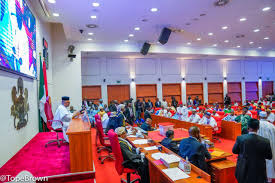.Seeks revocation of permit for WEMA project in Nigeria
By Valentine Amanze
The Health of Mother Earth Foundation(HOMEF) has appealed to the National Biosafety Management Agency (NBMA) to revoke the permits granted for the Water Efficient Maize for Africa (WEMA) project in Nigeria.
It said that the appeal became necessary because the maize event (MON87460) has repeatedly failed in other countries.
WEMA, also referred to as TELA maize, is a project of the seed and chemical company, Monsanto (now Bayer) and Gates Foundation, which was approved by the NBMA for field trial in Nigeria along with the added event (MON 89034) claimed to confer resistance to lepidopteran insect pests.
HOMEF Project Officer, Joyce Ebebeinwe, disclosed this in a statement.
The group further pointed out that a recent report by the United States Department of Agriculture (USDA) indicated that the performance of genetically modified maize variety acclaimed to be drought tolerant is poor both in terms of yields and adoption by farmers, when compared with non-genetically modified drought tolerant maize.
“In October 2018, the South African biosafety authorities rejected the GM maize for commercial growing as it found that the data provided by Monsanto could not insufficiently prove the claimed drought tolerant and insect resistant capabilities of the maize event. There was no a yield nor agronomic performance advantage of the GM variety over the conventional varieties.
“In fact, the SA authorities found that the yields of the GM event were inconsistent and in some cases, the GM maize had lower yields than those of conventional maize, according to the kernel count per row and the kernel count per ear data.
“Similarly, in November 2018, the Permanent Secretary of the Ministry of Agriculture, Livestock and Fisheries in Tanzania, Mathew Mtigumwe, ordered an immediate halt to all ongoing field trials on GM maize crops, stacked with the drought tolerant traits. The trials conducted by the Tanzania Agriculture Research Institute (TARI) were ordered to be immediately stopped and the test remnants destroyed. The Permanent Secretary gave the order after the unauthorised use and release of the trial results by TARI” it stated.
HOMEF also stated that in Kenya, WEMA Project had been rebranded as TELA Maize and was being hyped by the promoters of agricultural biotechnology as effective against drought and the Fall Army Warm (FAW) although only a conditional approval had been given for National Performance Trials (NPTs) pending the results of a full and proper Environmental Impact Assessment (EIA).
But Nnimmo Bassey, the Director of HOMEF explained that while the WEMA project modifies a single or very few genes, drought tolerance in maize is dependent on numerous genes and the complex relationship which exists between them and the external environment.
He stated that the NBMA has dashed any hopes by Nigerians for strict regulation of GM foods, such that receipt of an application for permits translates to an approval for commercial dealings without proper and transparent risk assessments or consideration of public concerns.
“In a few years of establishment of the agency, applications/commercial release of GM food crops have been approved in what seems like a marathon and yet results of field trials are not accessible to the public. We should note that a previous application and a permit for Field Trial of the maize event-MON 89034 stacked with NK603 genetically modified for insect resistance and herbicide tolerance with Permit No: NBMA/C FT/001 was issued in Nigeria in 2016. NBMA is yet to announce the result of that trial,” he said.
Bassey also reiterated that GM technology was not needed in Nigeria as solution to the climate change or food challenges.
According to him, while the technology threatens human, animal and environmental health and compromises the rights of farmers to save and reuse seeds, there is no proof of their effectiveness in increasing productivity.
HOMEF therefore called on the Nigerian government to focus efforts on agricultural systems such as agroecology that not only ensures productivity but assures resilience to climate change impacts through improved diversity, reduces concentration of CO2 on the atmosphere, nourishes ecosystems and improve economic situations for farmers. Agroecology also provides remedies for pests and diseases through innovations such as the push and pull method that have proven effective against the fall army worm and other pests, the group stated.













